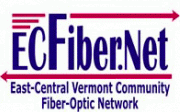
Fast, affordable Internet access for all.
When Vermont passed legislation to establish "communications union districts" in 2015, funding options expanded for regional community network ECFiber. Since then, other states trying to expand access to broadband in rural areas have looked at the success of ECFiber as a possible model. Now, New Hampshire is considering establishing a similar option as a way for local communities to improve local connectivity.
Waiting for Session
Democratic State Senator Jeanne Dietsch from Peterborough has drafted legislation she intends to introduce in the 2020 session. The bill will allow communities to establish "communications districts" to develop broadband infrastructure, similar to the way they band together in order to create sewer districts for necessary infrastructure. The entities are able to finance projects by applying for grants, loans, issuing bonds, and charging user fees, but are not able to tax.
In a recent GovTech article, Dietsch said:
“We modeled it on New Hampshire sewer districts just because that is language that’s already familiar to our legislators, and it’ll be much easier for them to pass it that way than to try to make it look like Vermont.”
The lawmaker was reflecting on difficulties the legislature had passing Senate Bill 103, which allows municipalities to work together for "multi-town bonding projects." Special interest lobbyists, whose job it is to maintain ISP monopolies, leveled their efforts at the bill when it appeared fearing the competition it might bring. Dietsch wants to avoid a similar fight with the communications district proposal, so has carefully crafted the language of the bill.
If passed, the new authority will allow cities to develop the infrastructure in order to work with private sector partners. ECFiber offers fast, affordable, reliable Internet access directly to the public, rather than providing fiber optic infrastructure for Internet access companies to use.
ECFiber
 Prior to becoming a communications union district, ECFiber was a community-driven project that was self-funded that had additional investment from a capital investment group. The new designation allowed them to expand further with funds raised from revenue bonds.
Prior to becoming a communications union district, ECFiber was a community-driven project that was self-funded that had additional investment from a capital investment group. The new designation allowed them to expand further with funds raised from revenue bonds.
Due to incremental expansion since 2011, the network now has 24 member towns, is offering symmetrical residential service up to 700 Megabits per second (Mbps) in 23 and has expanded citywide in 12. Many of the communities where ECFiber has deployed were operating on DSL or even older technology before fiber came to their communities. The network has even received grant funding to serve more households in rural Vermont.
Carroll County Broadband
If and when the bill passes, Carroll County Broadband may be the first entity to take advantage of the new authority. About 16 towns in the county have joined forces to form the committee. Their aim is to expand broadband access in the western New Hampshire county.
Co-chair Stephen Knox says that they want to head off a situation with broadband like that which occurred when private utility companies were electrifying the U.S.:
“The road that I live on never got electricity until the mid-1940s,” Knox said. “And there was a small town [in Carroll County] … they never got electricity until the 1970s. So our concern was that, recognizing the importance of broadband to our future, we could not basically let this become Act II of electrification.”
He and his committee colleagues have been watching ECFiber, “We firmly believe that having 16 towns sitting at the table gives us a far greater strength in negotiating contracts and so forth with Internet service providers than just each town on its own,” says Knox.
Nov. 21 Update:
We reached out to Carole Monroe, one of the people who for years championed the expansion of ECFiber and who recently began working on a new project, LymeFiber, in Lyme, New Hampshire. In an email, she provided an experienced perspective on the value of the proposed measure:
Communication District legislation will allow towns in New Hampshire to join with other towns in creating a municipal entity for the purpose of expanding broadband. Where the costs for creating a FTTP network may be too great for a single town, spreading the costs across a region allows for economies of scale. In addition, aggregating demand across many towns will give us the critical mass to achieve a take rate that can support a FTTP network. The District has the benefits of a municipality with the exception of the ability to tax. The debt is based on the revenues, or potential revenues, of the District and not directly on the taxpayer. In the end, the district will partner with an ISP operator to design, construct and operate their network and yet maintain local control of the construction schedule, network policies, and rates. It is the only solution to ensure no town gets left behind.
